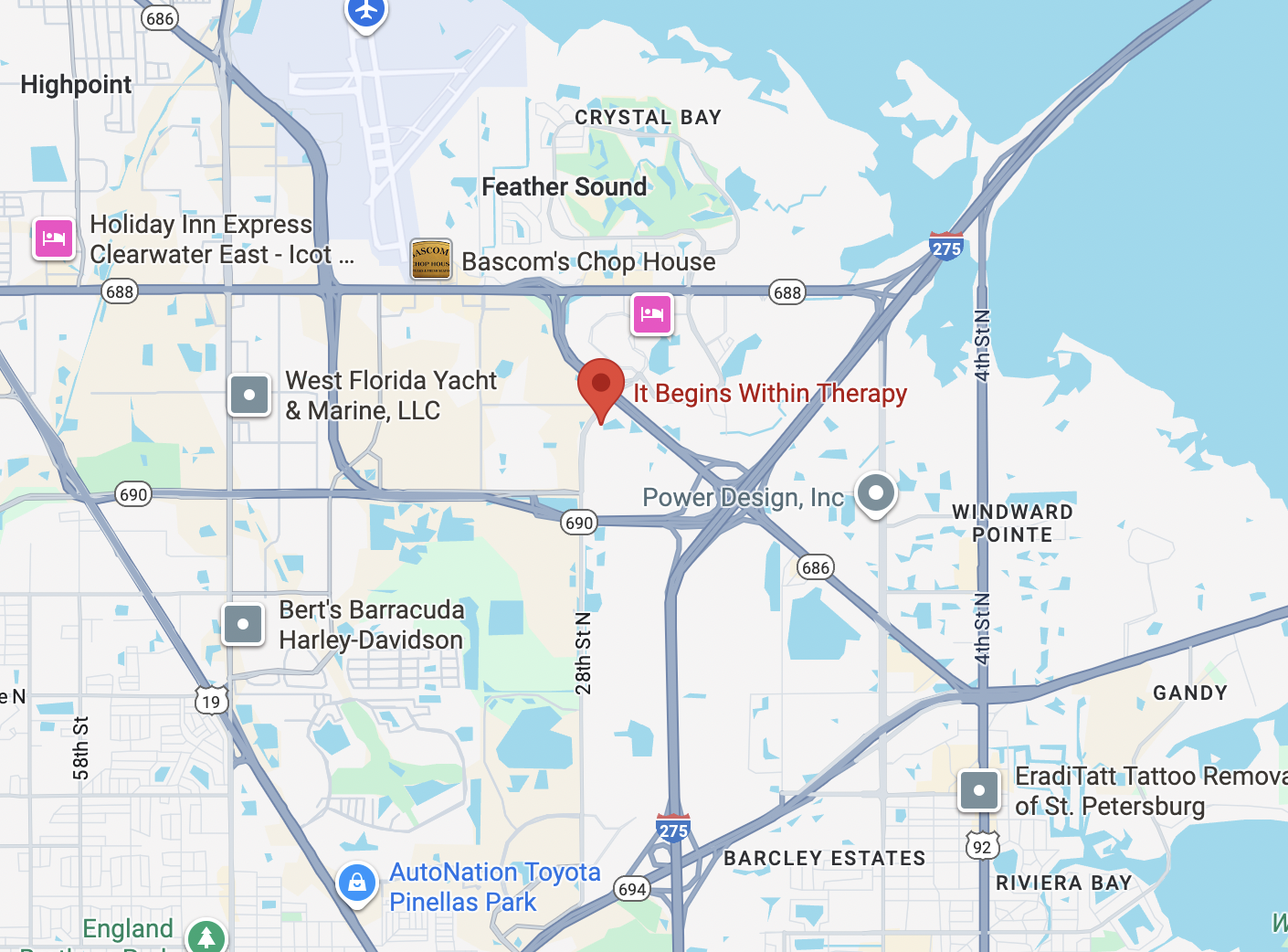PTSD Treatment in Tampa, St. Petersburg & Sarasota
PTSD is your body and mind’s natural response to overwhelming events and not a sign of weakness whatsoever. At IBW, we’ve supported hundreds of combat veterans, survivors of sexual assault, and adults who endured childhood abuse in finding relief from PTSD and Complex PTSD. Whether your trauma stems from violence, neglect, or sudden loss, the symptoms (flashbacks, anxiety, sleepless nights, and a constant feeling of being “on edge”) can feel exhausting and isolating. Our licensed trauma therapists in Tampa, St. Petersburg, and Sarasota specialize in providing evidence-based care such as EMDR, ART, and CPT, to help you process trauma safely and begin reclaiming your life.
Understanding PTSD and Its Impact
Post-traumatic stress disorder (PTSD) is a recognized mental health condition that develops after overwhelming events like combat, assault, accidents, natural disasters, or childhood abuse. Sometimes symptoms appear right away; other times they surface years later as Complex PTSD (C-PTSD).
PTSD is defined as a lasting stress response after experiencing or witnessing trauma. It goes beyond normal fear by causing intrusive memories or flashbacks, nightmares, heightened anxiety, and avoidance of reminders of the event. If these symptoms persist for more than a month and begin to disrupt daily life, relationships, or sleep, it may be PTSD — and professional help can make recovery possible.
PTSD does not discriminate. It can affect children, adults, men, and women from every walk of life — at any time. What matters most is knowing that healing is possible: with the right support, you can not only reclaim your life, but begin writing a new story for yourself — one filled with resilience, strength, and hope for the future.
PTSD Treatment in Tampa & St. Petersburg
Effective PTSD treatment combines the right therapy, skills, and — when needed — medication to support long-term healing. At It Begins Within, our licensed therapists in Tampa and St. Petersburg use a personalized approach that may include evidence-based trauma therapies like EMDR, ART, and CPT, alongside coping skill development, mindfulness strategies, and stress management techniques. For some clients, collaboration with psychiatric providers for PTSD medication management adds another layer of support. By blending these approaches, we help you not only reduce symptoms but build lasting resilience and confidence in daily life.
Eye Movement Desensitization and Reprocessing (EMDR) helps reprocess traumatic memories so they no longer trigger overwhelming PTSD symptoms.
cognitive processing therapy
CPT teaches new ways of thinking about the trauma, reducing guilt and fear while building healthier patterns for daily life.
Somatic therapy focuses on how trauma lives in the body, using grounding, breathwork, and movement to ease PTSD symptoms.
When appropriate, PTSD medication can reduce anxiety, improve sleep, and support therapy, providing a balanced path to recovery.
Licensed PTSD Therapists in Tampa, St. Petersburg & Sarasota
Recognizing Symptoms of Post-Traumatic Stress Disorder (PTSD)
Post-Traumatic Stress Disorder (PTSD) can emerge after experiencing or witnessing a traumatic event, manifesting in a variety of physical and emotional symptomolgoy. Understanding these symptoms is the first step toward seeking trauma-informed therapy. Below, the key symptoms of PTSD will be explained, explore how they can differ across various individuals, and explain why early intervention is critical to prevent them from worsening.
Key Symptoms of PTSD
PTSD symptoms (trauma), can linger in the mind and body and typically are grouped into four main categories
Intrusive Thoughts - Unwelcome & distressing memories of the trauma that can present as vivid flashbacks, nightmares, or sudden recollections.
Avoidance Behaviors - You may go out of your way to avoid people, places, or activities that remind you of the trauma.
Mood Changes - Trauma can impact emotional wellbeing, leading to feelings of persistent sadness, guilt, or shame. You might even feel detached from loved ones or lose interest in hobbies that once brought joy. Most common mood changes result in anxiety and depression symptoms.
Physical Reactions - The body stays on high alert after trauma (fight or flight mode), resulting in symptoms like being easily startled, feeling tense or irritable, or struggling with sleep issues such as insomnia.
Children Suffering From PTSD
At It Begins Within, we specialize in helping children who have experienced trauma — from abuse and neglect, to loss or exposure to violence. PTSD often looks different in children than in adults, showing up as clinginess, tantrums, separation anxiety, nightmares, or regressions.
Our licensed child therapists use evidence-based approaches tailored for young clients, including Trauma-Focused Cognitive Behavioral Therapy (TF-CBT), EMDR for children, and Cognitive Processing Therapy (CPT). These proven methods give kids the tools to process trauma safely, build resilience, and restore a sense of safety and stability at home and school.
Identifying PTSD Symptoms in Your Child
If your child has frequent nightmares, sudden mood changes, heightened anxiety, or avoids places that remind them of a traumatic event, they may be showing signs of PTSD. Early intervention can make all the difference — and we’re here to help.
Frequently Asked Questions About PTSD
Answers provided by It Begins Within Therapy Founder, Dr. Mary Perleoni, LMHC
What are the 7 symptoms of PTSD?
Dr. Perleoni: In my work with clients here in Tampa, PTSD often shows up in very real, day-to-day ways that can feel overwhelming. The classic symptoms fall into four main categories, but I see seven common struggles:
Intrusive memories – vivid flashbacks or distressing recollections that pop up when you least expect them.
Nightmares – dreams that disrupt sleep and make you dread going to bed.
Avoidance behaviors – steering clear of people, places, or conversations that bring the trauma back.
Negative mood changes – feelings of guilt, shame, or emotional numbness that make it hard to connect with loved ones.
Hypervigilance – being on constant alert, easily startled, or unable to relax in public spaces.
Difficulty concentrating – struggling with memory, focus, or finishing tasks at work or school.
Physical reactions – a racing heart, sweating, or nausea when triggered by reminders of the trauma.
If these symptoms last more than a month and start to interfere with daily life, that’s when I encourage seeking professional support. You don’t have to “just live with it.”
Can PTSD be healed?
Dr. Perleoni: I want to be very clear — healing from PTSD is absolutely possible. I’ve worked with combat veterans, survivors of abuse, and professionals who never thought life could feel normal again. With the right evidence-based therapies, most people notice significant improvement, often within the first few months. Recovery doesn’t erase what happened, but it does mean you can reclaim your life, find peace again, and move forward without feeling trapped by the past.
What is the best therapy for PTSD?
Dr. Perleoni: There isn’t a single “one-size-fits-all” therapy, because trauma affects each person differently. At our Tampa and St. Petersburg offices, we use approaches like:
Cognitive Processing Therapy (CPT) – helps shift unhelpful beliefs like guilt or self-blame.
Eye Movement Desensitization & Reprocessing (EMDR) – reprocesses traumatic memories so they lose their intense emotional charge.
Prolonged Exposure (PE) – gradually helps you face trauma reminders in a safe, structured way.
Some clients prefer a cognitive approach, others benefit more from body-based or somatic therapies. My role is to help match you with the approach that fits your story, your comfort level, and your goals.
How long do people with PTSD need to stay in therapy to get better?
Dr. Perleoni: This is one of the most common questions I get in Tampa. The honest answer is: it depends. For single-incident trauma (like a car accident), many people see major relief after 8–15 sessions of CPT or EMDR. With more complex or childhood trauma, treatment can take longer — sometimes 6 months to 2 years.
What I’ve seen consistently is that clients often start noticing shifts within the first month: better sleep, less reactivity, or more confidence in daily routines. Therapy length really depends on your trauma history, your support system, and your willingness to engage in the process.
What coping skills can I do on my own to help manage PTSD symptoms?
Dr. Perleoni: I always encourage my clients to build a toolbox of coping skills. A few that work well:
Grounding techniques – like the 5-4-3-2-1 method, to pull you back when flashbacks hit.
Breathing and muscle relaxation – to calm your nervous system during spikes of anxiety.
Mindfulness and journaling – to stay present and safely process emotions.
Exercise – even a 20-minute walk can help discharge trauma stored in the body.
Routine – structure creates predictability, which helps your brain feel safe.
These tools don’t replace therapy, but they can make daily life feel more manageable while we do the deeper work together.
What is Complex PTSD?
Dr. Perleoni: Complex PTSD (C-PTSD) usually comes from trauma that was prolonged and inescapable — like childhood abuse, domestic violence, or repeated relational trauma. Along with the typical PTSD symptoms, people with C-PTSD often struggle with emotion regulation, a negative self-concept, and difficulty trusting or staying connected in relationships.
Healing C-PTSD often requires a phased approach: first establishing safety and stability, then carefully processing trauma, and finally working on reconnecting with life and relationships. I’ve walked alongside many clients through this process, and while it takes time, the transformation can be profound.
What does a PTSD episode look like?
Dr. Perleoni: Episodes look different for everyone, but here’s what I often see in clients: a sudden flashback, zoning out, panic attacks, or feeling frozen in place. Sometimes it’s uncontrollable crying, other times it’s anger or withdrawal. Physically, people may shake, sweat, or feel their heart pounding.
If you’re with someone during an episode, the most helpful response is to stay calm, speak gently, and remind them they’re safe in this moment. In therapy, we practice skills to handle these episodes so that over time, they lose their intensity and frequency.
Why PTSD Support Matters in Tampa Bay
At It Begins Within Healing Center, we work with individuals and families across Tampa, St. Petersburg, and the greater Tampa Bay area. Post-traumatic stress doesn’t just affect veterans or survivors of severe trauma, it impacts people from all walks of life. This includes those navigating adversity from childhood, relationship trauma, and chronic stress.
Understanding the facts about PTSD
The National Center for PTSD, estimates that approximately 13 million U.S. adults have PTSD during a given year. Source: U.S. Department of Veterans Affairs
While another important study found that those suffering with untreated PTSD also significantly impacted their physical health. The link to negative physical ailments was clear: the likelihood of respiratory issues increased by 2.6x, the likelihood of suffering from migraines was 1.9x higher and a 1.4x increased likelihood of diabetes. Source: NIH
These national numbers mirror what we witness across our clients in Tampa, PTSD is more common and more disruptive than many people realize. But healing is absolutely possible with the right tools and support.
If you're seeking PTSD therapy in Tampa whether for yourself or a loved one, our team offers trauma-informed care designed to help you process what you've been through and regain a sense of peace.
PTSD Therapy Virtually & Near You in Florida
PTSD Therapy in St. Petersburg, FL
At It Begins Within Therapy in St. Petersburg, our licensed trauma therapists specialize in PTSD therapy, including EMDR, cognitive processing therapy (CPT), and exposure therapy for PTSD. We help adults and couples heal from trauma in a calm, supportive environment—serving communities across Pinellas County, including Clearwater, Largo, Gulfport, Seminole, Feather Sound, and Treasure Island.
PTSD Therapy in Tampa, FL
Our Tampa PTSD therapy clinic, located near Westshore, provides personalized trauma treatment for adults, professionals, and families throughout Hillsborough County—including South Tampa, Hyde Park, Carrollwood, Brandon, and Riverview. Our therapists use evidence-based methods such as CBT for PTSD and EMDR trauma therapy to help reduce flashbacks, anxiety, and hypervigilance so you can rebuild a sense of safety and confidence.
In-Person PTSD Therapy in Sarasota, FL
Our Sarasota office offers in-person PTSD counseling for clients from Lakewood Ranch, Siesta Key, Venice, and Palmer Ranch. Our therapists specialize in trauma-focused care, integrating EMDR, mind-body therapy, and cognitive behavioral therapy for PTSD to help you process traumatic memories and restore calm to your nervous system.

Schedule Free Consultation
We offer comprehensive mental health services and free consultations with all of our trauma therapists. If you’re searching for PTSD counseling, we would be honored to be a part of your healing journey.




















